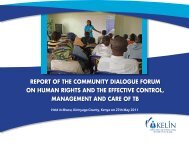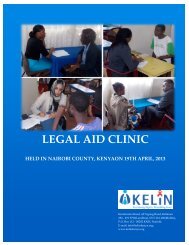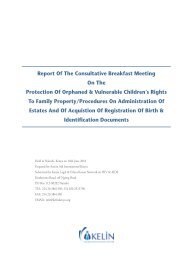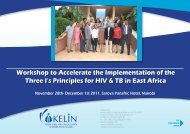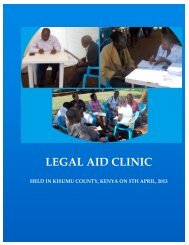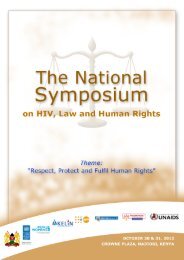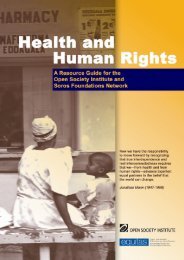- Page 1:
WHAT WORKSFOR WOMEN AND GIRLSEviden
- Page 4:
Authors:Jill Gay, MAKaren Hardee, P
- Page 7 and 8:
Jose Esparza, MD, Ph.D.Senior Advis
- Page 9 and 10:
Shyam Kottilil, MD, Ph.D.Staff Clin
- Page 11 and 12:
Larry Slutsker, MD, MPHChief, Malar
- Page 13 and 14:
Table of ContentsList of Abbreviati
- Page 15 and 16:
List of Abbreviations3TCACTAHIANCAP
- Page 17:
PEPPHAPHRPIDPLHAPMTCTPPEPPTPRPTPRBP
- Page 20 and 21:
MethodologyMeasuring “what works
- Page 24 and 25:
2. Hormonal contraception is safe f
- Page 26 and 27:
outcomes has been more difficult to
- Page 28 and 29:
2. Promoting contraceptives and fam
- Page 30 and 31:
International Political Commitments
- Page 32 and 33:
established national action plans o
- Page 34 and 35:
Organization of the DocumentThis do
- Page 36 and 37:
Table 1.1Countries included in What
- Page 38 and 39:
understanding the epidemic in any g
- Page 40 and 41:
girls in school, for example. The c
- Page 42 and 43:
Within each intervention, studies a
- Page 45 and 46:
Chapter 3.Prevention for WomenA. Ma
- Page 47 and 48:
Special Risks for WomenStill, despi
- Page 49 and 50:
AIDS cases reported from 1982 to 20
- Page 51 and 52:
experience observed in clinical tri
- Page 53 and 54:
Female Condoms Are the Only Female-
- Page 55 and 56:
condom if it gives them more pleasu
- Page 57 and 58:
Correct use of the female condom ha
- Page 59 and 60:
A two month prospective study from
- Page 61 and 62:
A study of trends from Demographic
- Page 63 and 64:
8. Peer education for women can inc
- Page 65 and 66:
3B. Prevention for Women: Partner R
- Page 67 and 68:
matic focus on partner reduction, y
- Page 69 and 70:
of HIV acquisition, but were either
- Page 71 and 72:
four visits, each participant was i
- Page 73 and 74:
What Works—Prevention for Women:
- Page 75 and 76:
vention immediately following the b
- Page 77 and 78:
Chapter 4.Prevention for Key Affect
- Page 79 and 80:
2010). Transgender men and women al
- Page 81 and 82:
confidentiality—violate human rig
- Page 83 and 84:
there were major socio-demographic
- Page 85 and 86:
and post-intervention were used to
- Page 87 and 88:
tent condom use and 1.5 times more
- Page 89 and 90:
to their peers, distribute condoms
- Page 91 and 92:
Gaps in Programming—Female Sex Wo
- Page 93 and 94:
of a sexual relationship with a pri
- Page 95 and 96:
than were naltrexone or placebo. HI
- Page 97 and 98:
attributed to …swift introduction
- Page 99 and 100:
Promising Strategies:5. Sex-segrega
- Page 101 and 102:
9. Programming to prevent initiatio
- Page 103 and 104:
D’Ivoire, Cuba, Estonia, Indonesi
- Page 105 and 106:
Gaps in Programming—Women Prisone
- Page 107 and 108:
EVIDENCEPromising Strategies:1. Vol
- Page 109 and 110:
In fact, as of September 2008, 66 o
- Page 111 and 112:
Transgender women and men are often
- Page 113:
2009). “The invisibility and marg
- Page 116 and 117:
especially young women, have their
- Page 118 and 119:
negotiation skills and other critic
- Page 120 and 121:
to be reached with sex and HIV educ
- Page 122 and 123:
What Works—Prevention for Young P
- Page 124 and 125:
44% and 100% of participants (Kirby
- Page 126 and 127:
tudes, self-efficacy, intentions, a
- Page 128 and 129:
as young people in this area had li
- Page 130 and 131:
ical validity of the findings that
- Page 132 and 133:
study reported having received info
- Page 134 and 135:
nancy. Almost 87% of men and 89% of
- Page 136 and 137:
last sex, having ever used a condom
- Page 138 and 139:
Gap noted, for example, in South Af
- Page 140 and 141:
Disaggregated Data Is NeededEffecti
- Page 142 and 143:
were also effective in increasing u
- Page 145 and 146:
Chapter 6.HIV Testing and Counselin
- Page 147 and 148:
Equitable Access to Testing and Cou
- Page 149 and 150:
they would come for HIV testing, re
- Page 151 and 152:
their jobs (Human Rights Watch, 200
- Page 153 and 154:
What Works—HIV Testing and Counse
- Page 155 and 156:
women. Of all married HIV-positive
- Page 157 and 158:
A study in Ethiopia found that inco
- Page 159 and 160:
At a provincial hospital in Mombasa
- Page 161 and 162:
Between June and December 2007, mob
- Page 163 and 164:
Promising Strategies:6. Encouraging
- Page 165 and 166:
10. Counseling may reduce risk beha
- Page 167 and 168:
women learned violence prevention s
- Page 169 and 170:
Chapter 7.TreatmentA. Provision and
- Page 171 and 172:
Treatment Has Been Successfully Adm
- Page 173 and 174: HIV Prevention Is Needed as well as
- Page 175 and 176: Gaps in Programming—Provision and
- Page 177 and 178: These practices and tools are usefu
- Page 179 and 180: Non-judgmental, non-stigmatizing in
- Page 181 and 182: percent among ART-experienced patie
- Page 183: (Donnell et al., 2010). (Abstract)
- Page 186 and 187: The sexual health of women is an im
- Page 188 and 189: [ for women living with HIV]: impro
- Page 190 and 191: Available GuidelinesA number of sex
- Page 192 and 193: advantages of dual method use, alon
- Page 194 and 195: contraception: 57% used hormonal co
- Page 196 and 197: different; and progression to WHO c
- Page 198 and 199: HIV-related behavioral or biologic
- Page 200 and 201: use was positively associated with
- Page 202 and 203: Gaps in Programming—Meeting the S
- Page 204 and 205: Interactions between ARVs and oral
- Page 207 and 208: Chapter 9.Safe Motherhood and Preve
- Page 209 and 210: Pillar 1: Preventing Primary HIV In
- Page 211 and 212: mission of HIV. HIV testing and cou
- Page 213 and 214: EVIDENCE1. Preventing unintended pr
- Page 215 and 216: Gaps in Programming—Reducing Unin
- Page 217 and 218: 9B. Safe Motherhood and Preventiono
- Page 219 and 220: EVIDENCEPromising Strategies:1. Dis
- Page 221 and 222: Gaps in Programming—Pre-Conceptio
- Page 223: 9C-1. Safe Motherhood and Preventio
- Page 227 and 228: outine tests. Fifty percent of the
- Page 229 and 230: An evaluation of UNICEF-funded PMTC
- Page 231 and 232: and syphilis (by rapid plasma regai
- Page 233 and 234: 2. Additional efforts are needed to
- Page 235 and 236: for their own disease” (ITPC, 200
- Page 237 and 238: own health needs has never been eva
- Page 239 and 240: dine and lamivudine during pregnanc
- Page 241 and 242: chose elective cesarean section to
- Page 243 and 244: their current pregnancy or a past p
- Page 245 and 246: Promising Strategies:5. Integrating
- Page 247 and 248: Gaps in Programming—Treatment1. I
- Page 249 and 250: cesarean, and 221 were non-elective
- Page 251 and 252: 3. Efforts are needed to ensure tha
- Page 253 and 254: “There is no doubt that there are
- Page 255 and 256: formula feeding increases the risk
- Page 257 and 258: of age. For breastfed infants, the
- Page 259 and 260: weeks of gestation and continued un
- Page 261 and 262: A study in Côte d’Ivoire with 54
- Page 263 and 264: during breastfeeding compared with
- Page 265 and 266: 3 times higher for infants who were
- Page 267 and 268: counseling tools are needed. Studie
- Page 269 and 270: Chapter 10.Preventing, Detecting an
- Page 271 and 272: latent infection. Some immunocompro
- Page 273 and 274: concurrent active TB and HIV infect
- Page 275 and 276:
mortality of HIV-positive people re
- Page 277 and 278:
in a 65% decline in mortality and t
- Page 279 and 280:
1. Efforts are needed to reduce TB-
- Page 281 and 282:
al., 2004 cited in Slutsker and Mar
- Page 283 and 284:
stillbirths by 33%. Three cluster-r
- Page 285 and 286:
Gaps in Programming—Malaria1. Fur
- Page 287 and 288:
dose global coverage was just 27% i
- Page 289 and 290:
Chapter 11.Strengthening the Enabli
- Page 291 and 292:
combining microfinance and training
- Page 293 and 294:
pants meeting once per week for thr
- Page 295 and 296:
the men believed that they should n
- Page 297 and 298:
in the intervention village were si
- Page 299 and 300:
positive impacts. The quasi-experim
- Page 301 and 302:
Samoa, Serbia and Montenegro, Thail
- Page 303 and 304:
factor associated with sexual assau
- Page 305 and 306:
What Works—Strengthening the Enab
- Page 307 and 308:
worked with women’s groups, radio
- Page 309 and 310:
of school in addressing gender-base
- Page 311 and 312:
11C. Strengthening the Enabling Env
- Page 313 and 314:
also widely used worldwide and part
- Page 315 and 316:
ecognize women’s property rights
- Page 317 and 318:
Promising Strategies:2. Community o
- Page 319 and 320:
11D. Strengthening the Enabling Env
- Page 321 and 322:
What Works—Strengthening the Enab
- Page 323 and 324:
more likely to report having used a
- Page 325 and 326:
likely than illiterate women to kno
- Page 327 and 328:
of the women surveyed were HIV-posi
- Page 329 and 330:
countries extending the fee aboliti
- Page 331 and 332:
families and separated from their c
- Page 333 and 334:
What Works—Strengthening the Enab
- Page 335 and 336:
used the resource “Understanding
- Page 337 and 338:
6. Support groups for people living
- Page 339 and 340:
11G. Strengthening the Enabling Env
- Page 341 and 342:
EVIDENCEPromising Strategies:1. Inv
- Page 343 and 344:
Chapter 12.Care and SupportA. Women
- Page 345 and 346:
ical care provided by family member
- Page 347 and 348:
dealing with their sorrow, grief, a
- Page 349 and 350:
What Works—Care and Support: Wome
- Page 351 and 352:
2. Peer support groups can be highl
- Page 353 and 354:
discriminated unjustly against them
- Page 355 and 356:
6. Home-based antiretroviral therap
- Page 357 and 358:
12B. Care and Support: Orphans and
- Page 359 and 360:
(Thurman et al., 2007). As of 2008,
- Page 361 and 362:
care and services were provided, wh
- Page 363 and 364:
for treatment can be safely monitor
- Page 365 and 366:
A study done in Kenya (year not giv
- Page 367 and 368:
ather than a narrowly defined HIV/A
- Page 369:
7. Further interventions to provide
- Page 372 and 373:
ning providers, antenatal care and
- Page 374 and 375:
What Works—Structuring Health Ser
- Page 376 and 377:
counts available at primary health
- Page 378 and 379:
Pregnant women reported feeling out
- Page 380 and 381:
Before implementation of the PMTCT
- Page 382 and 383:
accessing PMTCT. An evaluation of 3
- Page 384 and 385:
A mathematical model based on TB tr
- Page 386 and 387:
1. Improved integration is needed b
- Page 388 and 389:
15. Additional efforts are needed t
- Page 390 and 391:
Community-based Care is holistic ca
- Page 392 and 393:
Microfinance is often defined as fi
- Page 394 and 395:
Sexuality is a central aspect of be
- Page 397 and 398:
References 1Aaron, E. and S. Crinit
- Page 399 and 400:
Akabaysh, H. and G. Psacharopoulos.
- Page 401 and 402:
Andia, I., A. Kaida, M. Maier, D. G
- Page 403 and 404:
Auvert, B., D. Taljaard, E. Lagarde
- Page 405 and 406:
Barker, P., C. McCanno, N. Mehta, C
- Page 407 and 408:
Berer, M. 2008b. “Male Circumcisi
- Page 409 and 410:
Bong, C-N., S. Chen, Y-J. Jong, T-S
- Page 411 and 412:
Brou, H., G. Djohan, R. Becquet, G.
- Page 413 and 414:
Campbell, L. and M. Lambey. 2002.
- Page 415 and 416:
Chama, C., W. Gashau and S. Oguche.
- Page 417 and 418:
Chimwaza, A., J. Chimango, C. Kapon
- Page 419 and 420:
Cluver L. and F. Gardner. 2007. “
- Page 421 and 422:
Coovadia, H. 2004. “Antiretrovira
- Page 423 and 424:
De Bruyn, M. 2006a. There’s Nothi
- Page 425 and 426:
Dharmadhikari, A., J Gupta, M. Deck
- Page 427 and 428:
Druce, N. and A. Nolan. 2007. “Se
- Page 429 and 430:
Epstein H. 2009. “Universal volun
- Page 431 and 432:
Farrell, B. and N. Rajani. 2007.
- Page 433 and 434:
Ford, N., D. Wilsono, P. Cawthorne,
- Page 435 and 436:
Galvez-Buccollini, J., S. DeLea, P.
- Page 437 and 438:
Gillespie, D., H. Bradley, M. Wolde
- Page 439 and 440:
Gogna, M., M. Pechny, I. Ibarlucia,
- Page 441 and 442:
Grimes, D., J. Benson, S. Singh, M.
- Page 443 and 444:
Haddock, S., K. Hardee, J. Gay, P.
- Page 445 and 446:
Harries, A., R. Chimizi and R. Zach
- Page 447 and 448:
Hillemans, P., T. Ellerbrock, S. Mc
- Page 449 and 450:
Hope, R. 2007. Addressing Cross-Gen
- Page 451 and 452:
Innes, C, S Charalambous, M Felix,
- Page 453 and 454:
Islander, F. 2006. Plenary Presenta
- Page 455 and 456:
Jewkes, R. 2007. “Comprehensive R
- Page 457 and 458:
Kadando, R., J. Lyavala and M. Mulo
- Page 459 and 460:
Karnell, A.P., P.K. Cupp, R.S. Zimm
- Page 461 and 462:
Maharashtra, India.” Abstract THP
- Page 463 and 464:
Kim, Y., A. Kols, R. Nyakauru, C. M
- Page 465 and 466:
Knerr, W., McEachran, J. and Philpo
- Page 467 and 468:
Laga, M., M. Alary, N. Nzila, A. Ma
- Page 469 and 470:
Leonard, L., I. Ndiaye, A. Kapadia,
- Page 471 and 472:
Luke, N. and K. Kurz. 2002. Cross-g
- Page 473 and 474:
Mahendra, V., R. Verma, S. Singh, S
- Page 475 and 476:
Prevent HIV Mother-to-Child Transmi
- Page 477 and 478:
McIntyre, J. and M. Lallemont. 2008
- Page 479 and 480:
Minaya, J., A. Owen-Simth and J. He
- Page 481 and 482:
Morrison, C. 2009. “Hormonal Cont
- Page 483 and 484:
Musaba, E., C. Morrison, M. Sunkutu
- Page 485 and 486:
Nelson, K., D. Celentano, S. Euimtr
- Page 487 and 488:
Nyamukapa A., S. Gregson, B. Lopman
- Page 489 and 490:
Olaleye, A., D. Polsy, D. Atamawanl
- Page 491 and 492:
Paiva, V., E. Felipe, N. Santos, T.
- Page 493 and 494:
Peacock, D. 2009. “Working with M
- Page 495 and 496:
Pillai, S., M. Seshu and M. Shivdas
- Page 497 and 498:
Puntos de Encuentro. 2008. Final Ev
- Page 499 and 500:
Reniers, G., T. Araya, G.Davey, N.
- Page 501 and 502:
Ross, D., J. Changalucha, A. Obasi,
- Page 503 and 504:
an Operations Research Study in Zam
- Page 505 and 506:
Sekirime, W. and J. Lule. 2009. “
- Page 507 and 508:
Shuey, D., B. Baishangire, S. Omiat
- Page 509 and 510:
Smith D. 2007. “Modern Marriage,
- Page 511 and 512:
Stanwood N., S. Cohn, J. Heiser and
- Page 513 and 514:
Stuikyte, R. S. Schonning and S. Me
- Page 515 and 516:
Taylor, E. A. Pettifor, B. Mupenda,
- Page 517 and 518:
Todd, J., D. Maher, I. Kasamba, E.
- Page 519 and 520:
UNAIDS. 2007b. “The Positive Part
- Page 521 and 522:
UNIFEM. 2008. http://www.genderanda
- Page 523 and 524:
Verhoeff, F. B. Brabin, C. Hart, L.
- Page 525 and 526:
Wang, X. and Z. Wu. 2007. “Factor
- Page 527 and 528:
Wilcher, R., T. Petruney, H. Reynol
- Page 529 and 530:
World Health Organization (WHO). 20
- Page 531 and 532:
Yankah, E., J. Ayres, S. Arruda and
- Page 534:
“What Works compiles a wealth of




